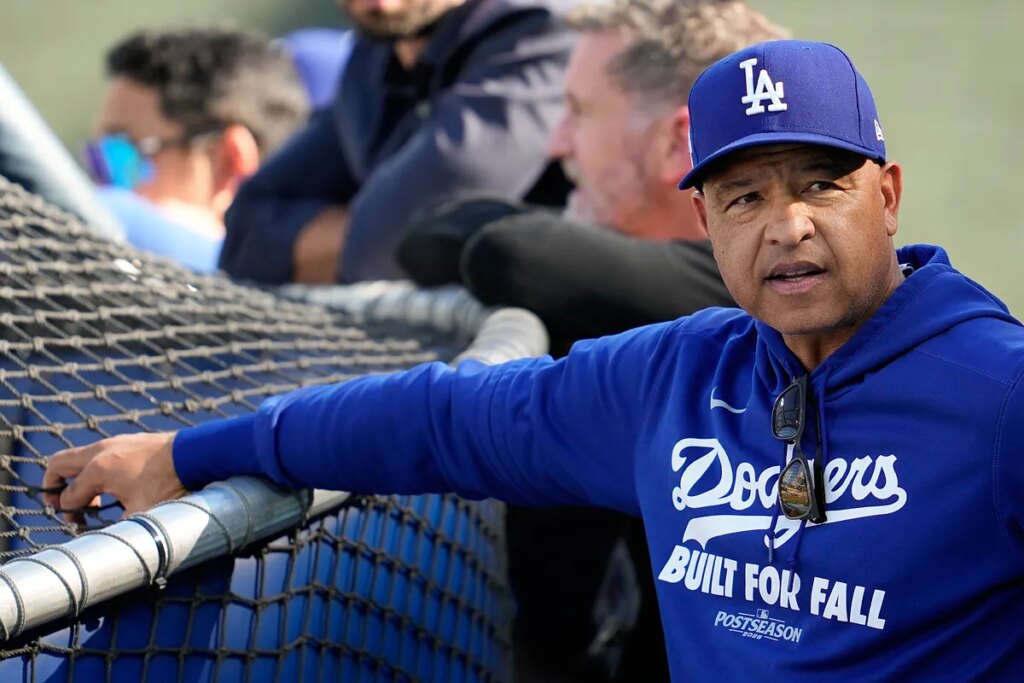The Los Angeles Dodgers were riding high into Game 1 of the NLCS thanks to a dominant outing from Blake Snell, who fired eight scoreless innings while allowing only one hit.
But what started as a showcase of pitching mastery soon turned into a flashpoint for criticism – because Dave Roberts opted to pull Snell after 103 pitches, bringing in rookie reliever Roki Sasaki.
That decision drew sharp rebukes from MLB commentators, particularly Rob Parker, who called it evidence of over-management.
Parker didn’t mince words: “Again, just over-managing when there’s no reason to over-manage. In this case, Snell was dominating. Let him get in trouble first.
“I’m sorry, stop over-managing. You’re not bringing in Mariano Rivera, and even then, still hesitate.”
The lance is pointed: when a pitcher is in total command, the conventional wisdom is often to ride momentum – not yank control prematurely.
Roberts‘ decision triggered instant debate over bullpen reliance in the postseason, especially when starters are performing at peak levels.
Some argue that pulling a pitcher after a dominant stretch is justifiable if the bullpen is trusted, pitch counts matter, or matchups dictate it. But when the starter is clearly in command, the margin for error becomes razor thin – and critics say Roberts crossed it.
When managing crosses the line
The line between strategic and excessive management is subtle – and often subjective. But in high-stakes playoff games, that margin is unforgiving.
Roberts must balance pitcher health, bullpen usage, matchups, and momentum. Too much micromanagement and you look reactive. Too little, and you risk injury or collapse.
Here, Roberts had to weigh Snell‘s pitch count (103 pitches), the risk of fatigue or decline in the ninth, and confidence in Sasaki to close it out.
But in Parker‘s view – and that of many analysts – Snell earned the chance to finish the job. To remove him prematurely seems like undermining what was one of the most dominant starts of the postseason.
This isn’t Roberts‘ first time receiving criticism for in-game decisions. Earlier in his tenure, fans and media questioned his handling of Clayton Kershaw during a perfect-game bid in 2022, when Roberts pulled him after seven innings despite being flawless.
Parker‘s comparison resurrected that memory, implying Roberts may have an impulse to over-control in pressure settings.
And yet the Dodgers‘ methods have worked before: they remain a perennial contender, often winning on depth, structure, and resource management.
Roberts is also managing pitchers with injury histories, high expectations, and long postseason workloads. He might argue that his cautious approach is meant to preserve arms and adapt to leverage.
But critics counter that playoff momentum is sacred – and when your starter is clearly the best option, you let him finish it.
Roberts may regret knee-jerk reaction
The pushback matters because it echoes a deeper tension in modern baseball: when to trust the veteran starter vs. when to turn to bullpen specialists and matchup thinking.
For a team like Los Angeles with pitching-rich depth, the temptation to rotate options is high – but so is the cost of seemingly overthinking.
In a sport of inches and seconds, managerial decisions are scrutinized heavily. When Roberts is accused of “over-managing,” it glosses over the layers behind the decision – but it also reflects a narrative dissatisfaction.
Many feel that in this case, the call was too cautious, too early, and ultimately too conservative when the moment demanded conviction.
Whether the move backfires or not, Parker‘s critique may linger. For a manager in the spotlight, Dave Roberts‘ handling of this situation will be judged not just on wins, but trust.
Read the full article here

